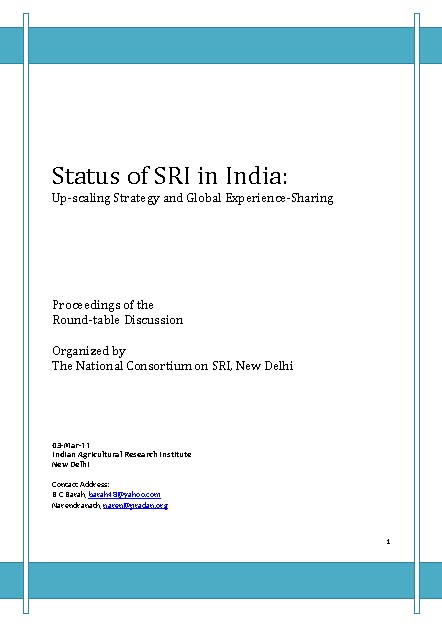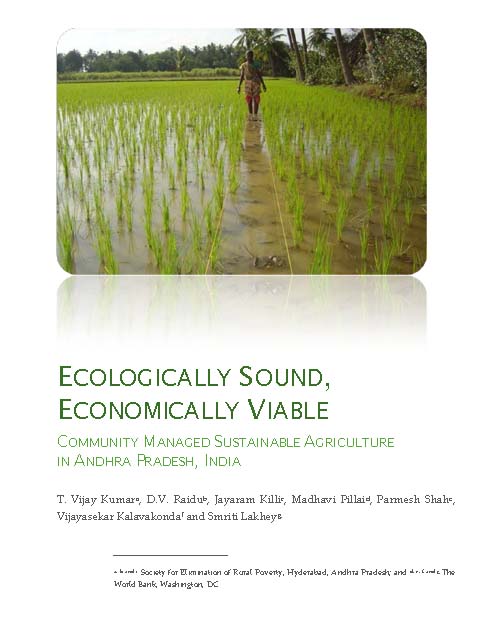Rainfed Agriculture
Status of SRI in India - Upscaling strategy and global experience sharing - A roundtable discussion at IARI
Posted on 26 May, 2011 08:16 AM The issues of sustainable food security assume national importance, as the country is debating on the crucial National Food Security Bill. Breaking yield barrier, accelerating growth of production and ensuring sustainability are the critical policy concerns in Indian agriculture.
The issues of sustainable food security assume national importance, as the country is debating on the crucial National Food Security Bill. Breaking yield barrier, accelerating growth of production and ensuring sustainability are the critical policy concerns in Indian agriculture.
The roundtable discussion underlined the need to harness the opportunities offered by the System of Rice Intensification (SRI) and its extensions to crop production in many areas. This may help in substantially reducing the need for embedded subsidies in every grain of rice while achieving increases in yield by 15 per cent to 40 per cent or more over present conventional methods. In India about 1.7 million farmers are estimated to have adopted the technique on more than 7.5 lakh hectares across 160 districts, without any major project funding so far. Tamil Nadu and Tripura are the leading states for adoption of SRI, but many others are following suit.
My experiment with SRI
Posted on 18 May, 2011 06:28 PMDue to my childhood acquaintance with paddy cultivation, I used to be curious to understand global processes and methodologies around this cultivation and to do better to help my local community benefit.
Sustainable Sugarcane Initiative (SSI) produces more sugarcane with less water and chemical inputs - Videos by AgSRI
Posted on 17 May, 2011 04:38 PM
Ecologically sound, economically viable community managed sustainable agriculture in Andhra Pradesh – A report by Society for Elimination of Rural Poverty and World Bank
Posted on 15 May, 2011 09:56 PM This report by Society for Elimination of Rural Poverty and World Bank deals with Community Managed Sustainable Agriculture (CMSA) in Andhra Pradesh. The paper also analyses the initial results of economic and environmental impact of CMSA, distills the key lessons learned from the Andhra Pradesh experience, and draws possible implications for future.
This report by Society for Elimination of Rural Poverty and World Bank deals with Community Managed Sustainable Agriculture (CMSA) in Andhra Pradesh. The paper also analyses the initial results of economic and environmental impact of CMSA, distills the key lessons learned from the Andhra Pradesh experience, and draws possible implications for future.
To address the adverse impacts of green revolution, the alternative approach to manage agriculture i.e., CMSA is being tested and practiced in the State. The CMSA approach replaces the use of chemical pesticides with a combination of physical and biological measures—including eco-friendly bio-pesticides—and complements it by adopting biological and agronomic soil fertility improvement measures leading to reduced use of chemical fertilizers.
Towards a Kisan Swaraj Policy based on people's control over agricultural resources
Posted on 11 May, 2011 07:10 AM This pan-Indian outreach effort involved dialogues with tens of thousands of citizens, demanding that the nation should devote urgent attention to the continuing agricultural crisis and allocate highest priority to the agriculture sector, ending decades of neglect.
This pan-Indian outreach effort involved dialogues with tens of thousands of citizens, demanding that the nation should devote urgent attention to the continuing agricultural crisis and allocate highest priority to the agriculture sector, ending decades of neglect.
"Media getting sensitive towards water and sanitation issues in North Bihar"-Recent updates from the work of Megh Pyne Abhiyan
Posted on 10 May, 2011 06:41 PM. I had shared how Megh Pyne Abhiyan through its local partner - Samta in Khagaria (supported by Gramyasheel, Kosi Seva Sadan, Ghoghardiha Prakhand Swarajya Vikas Sangh and Water Action) has been able to collaborate with the district administration to mainstream issues concerning water and sanitation for the flood prone areas.
In Supaul, the district administration requested our local partner, Gramyasheel to write about alternative drinking water practices (appropriate for the district) for a publication - Supaul Zila Ki Smarika, brought out by the district administration. A definite indication of the WATSAN practices being recognized at the local level. Though the collaboration is an ongoing process which would lead to positive results if time, ideas and perseverance are invested appropriately.
Enabling dry land farmers to cope with climate change in Karnataka - An article by R Dwarakinath, AME Foundation
Posted on 10 May, 2011 12:58 PMAuthor: R Dwarakinath
‘Miles to go before I sleep’ Indian agriculture, after green revolution, has fallen on to a lower trajectory of growth. But, this requires a different set of technologies and different kind of development strategy. This is necessary to lift sector production, alleviate poverty, regenerate ecology, and also to cope with climate change. A formidable but inevitable task.
Climate change has become a fact of life. The concern is assuming threatening proportions by the day. There are several efforts at the global, national and institutional levels to understand the phenomenon and to deal with its impact. At the moment, two dimensions of the problem are engaging the attention – how to mitigate, if possible reverse, the building up processes; and, how to cope with, if possible counter, the effects of climate change on human life, including farming. The answers are vague. So far, South Asia is regarded as one of the most vulnerable areas in the world. Naturally, it has become a matter of great concern, as it pertains to the well-being of the dry land farmers on the upland areas in Karnataka.
Traditional knowledge used in paddy cultivation in Raipur district of Chhattisgarh – A paper in the Indian Journal of Traditional Knowledge
Posted on 22 Apr, 2011 07:42 PMRice is the main crop cultivated in the State and several indigenous technologies are being used by farmers for seed germination, preventing the crop from insect/pest attack in the field as well as for storage.
Interventions that make agriculture sustainably high-yielding, eco-friendly and empower small-holder farmers - A research paper (2009)
Posted on 19 Apr, 2011 04:18 AMStating that modern agriculture increases production cost, the author observes that productivity of the same crop was higher in pre-British times than what it is now with modern agriculture techniques.
As these old agricultural techniques have not been scientifically researched there is a lot of scepticism which also results in them not being promoted. The paper lists out agricultural techniques, which result in sustainable high yields and are accepted by the scientific community.




